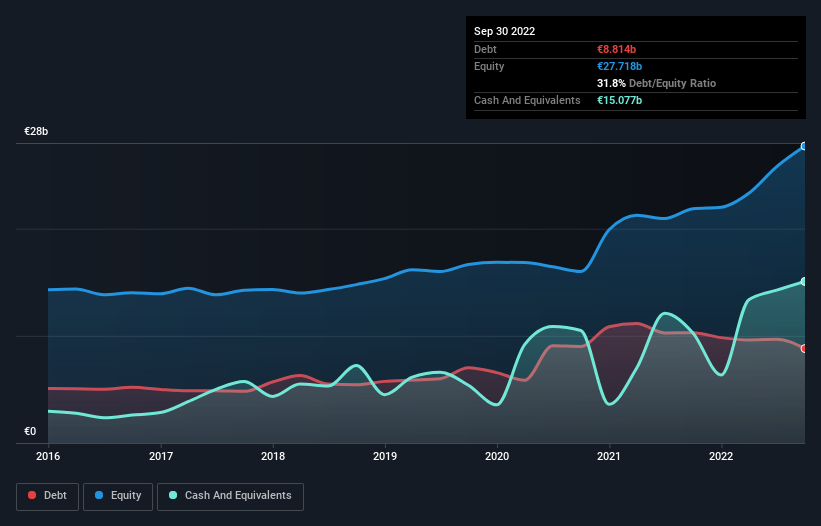
Legendary fund manager Li Lu (who Charlie Munger backed) once said, 'The biggest investment risk is not the volatility of prices, but whether you will suffer a permanent loss of capital.' So it seems the smart money knows that debt - which is usually involved in bankruptcies - is a very important factor, when you assess how risky a company is. Importantly, OMV Aktiengesellschaft (VIE:OMV) does carry debt. But the real question is whether this debt is making the company risky.
What Risk Does Debt Bring?
Generally speaking, debt only becomes a real problem when a company can't easily pay it off, either by raising capital or with its own cash flow. If things get really bad, the lenders can take control of the business. However, a more frequent (but still costly) occurrence is where a company must issue shares at bargain-basement prices, permanently diluting shareholders, just to shore up its balance sheet. Of course, debt can be an important tool in businesses, particularly capital heavy businesses. The first step when considering a company's debt levels is to consider its cash and debt together.
View our latest analysis for OMV
What Is OMV's Net Debt?
You can click the graphic below for the historical numbers, but it shows that OMV had €8.81b of debt in September 2022, down from €10.3b, one year before. However, its balance sheet shows it holds €15.1b in cash, so it actually has €6.26b net cash.

How Strong Is OMV's Balance Sheet?
The latest balance sheet data shows that OMV had liabilities of €18.7b due within a year, and liabilities of €17.0b falling due after that. Offsetting this, it had €15.1b in cash and €5.76b in receivables that were due within 12 months. So its liabilities outweigh the sum of its cash and (near-term) receivables by €14.8b.
This deficit is considerable relative to its very significant market capitalization of €15.4b, so it does suggest shareholders should keep an eye on OMV's use of debt. This suggests shareholders would be heavily diluted if the company needed to shore up its balance sheet in a hurry. While it does have liabilities worth noting, OMV also has more cash than debt, so we're pretty confident it can manage its debt safely.
Better yet, OMV grew its EBIT by 288% last year, which is an impressive improvement. That boost will make it even easier to pay down debt going forward. There's no doubt that we learn most about debt from the balance sheet. But ultimately the future profitability of the business will decide if OMV can strengthen its balance sheet over time. So if you want to see what the professionals think, you might find this free report on analyst profit forecasts to be interesting.
But our final consideration is also important, because a company cannot pay debt with paper profits; it needs cold hard cash. OMV may have net cash on the balance sheet, but it is still interesting to look at how well the business converts its earnings before interest and tax (EBIT) to free cash flow, because that will influence both its need for, and its capacity to manage debt. During the last three years, OMV produced sturdy free cash flow equating to 62% of its EBIT, about what we'd expect. This cold hard cash means it can reduce its debt when it wants to.
Summing Up
Although OMV's balance sheet isn't particularly strong, due to the total liabilities, it is clearly positive to see that it has net cash of €6.26b. And it impressed us with its EBIT growth of 288% over the last year. So we are not troubled with OMV's debt use. When analysing debt levels, the balance sheet is the obvious place to start. However, not all investment risk resides within the balance sheet - far from it. Be aware that OMV is showing 4 warning signs in our investment analysis , and 1 of those is significant...
Of course, if you're the type of investor who prefers buying stocks without the burden of debt, then don't hesitate to discover our exclusive list of net cash growth stocks, today.
New: AI Stock Screener & Alerts
Our new AI Stock Screener scans the market every day to uncover opportunities.
• Dividend Powerhouses (3%+ Yield)
• Undervalued Small Caps with Insider Buying
• High growth Tech and AI Companies
Or build your own from over 50 metrics.
Have feedback on this article? Concerned about the content? Get in touch with us directly. Alternatively, email editorial-team (at) simplywallst.com.
This article by Simply Wall St is general in nature. We provide commentary based on historical data and analyst forecasts only using an unbiased methodology and our articles are not intended to be financial advice. It does not constitute a recommendation to buy or sell any stock, and does not take account of your objectives, or your financial situation. We aim to bring you long-term focused analysis driven by fundamental data. Note that our analysis may not factor in the latest price-sensitive company announcements or qualitative material. Simply Wall St has no position in any stocks mentioned.
About WBAG:OMV
OMV
Operates as an energy and chemicals company in Austria, Germany, Romania, Norway, Belgium, New Zealand, the United Arab Emirates, the rest of Central and Eastern Europe, the rest of Europe, and internationally.
Flawless balance sheet established dividend payer.


